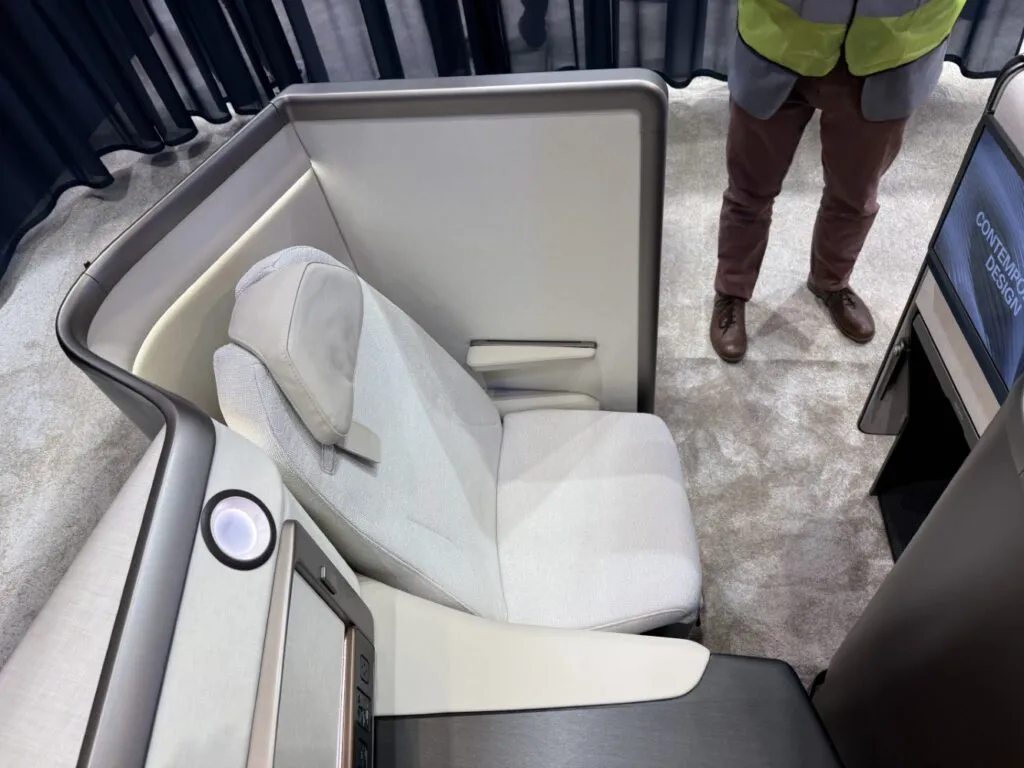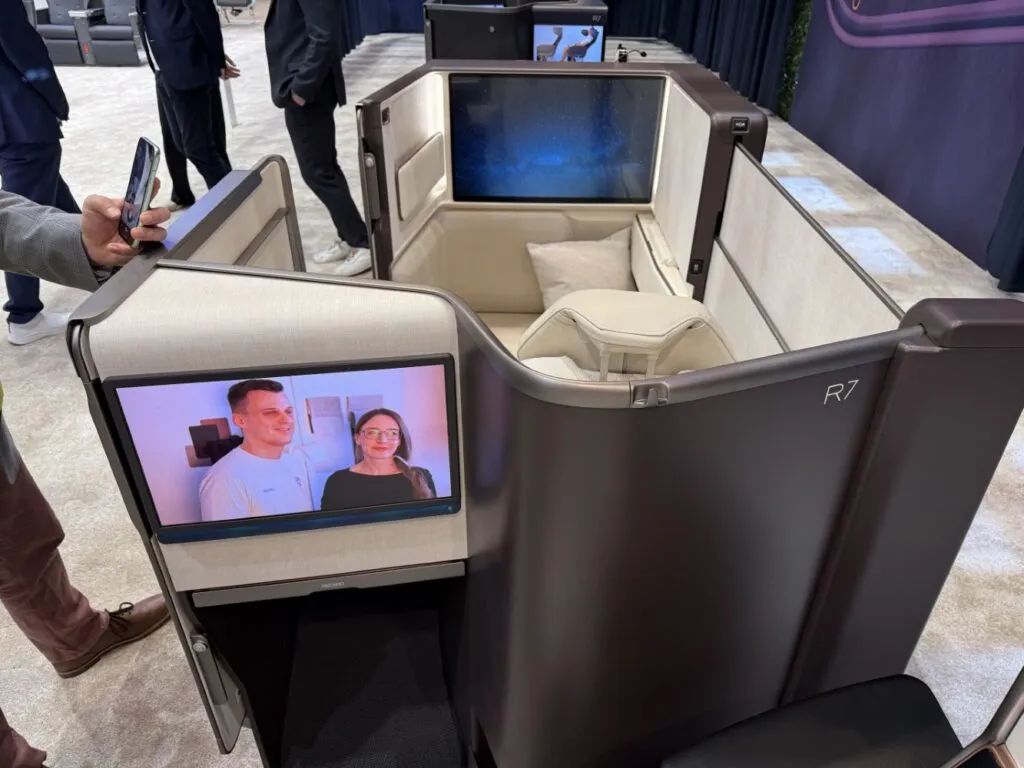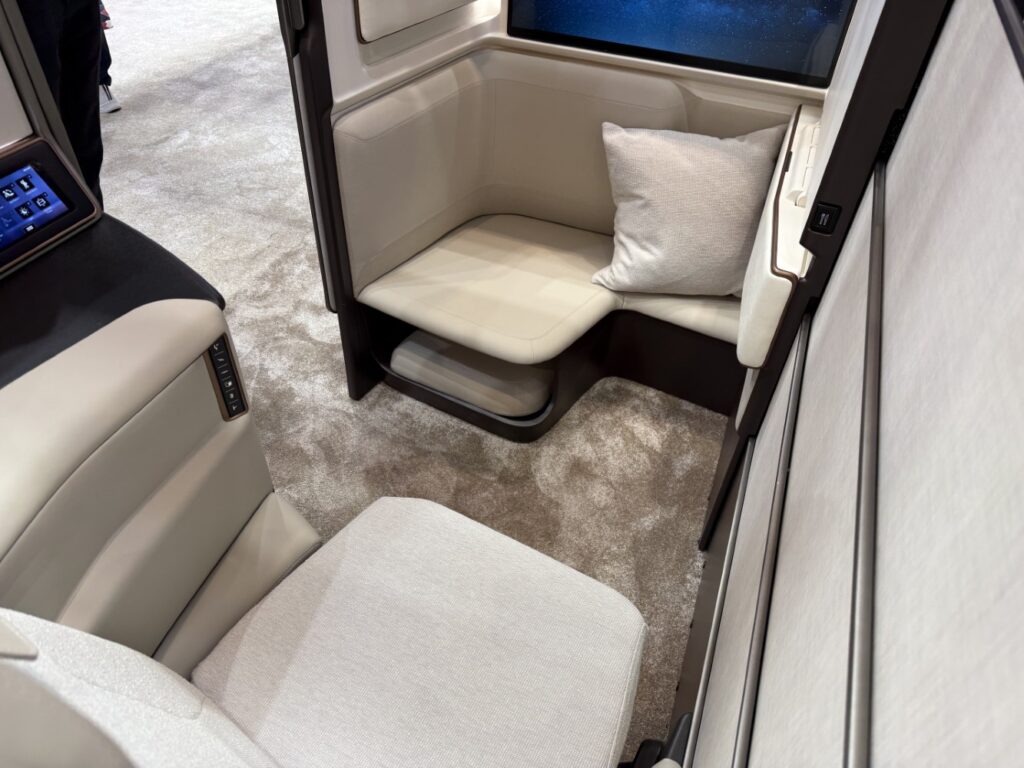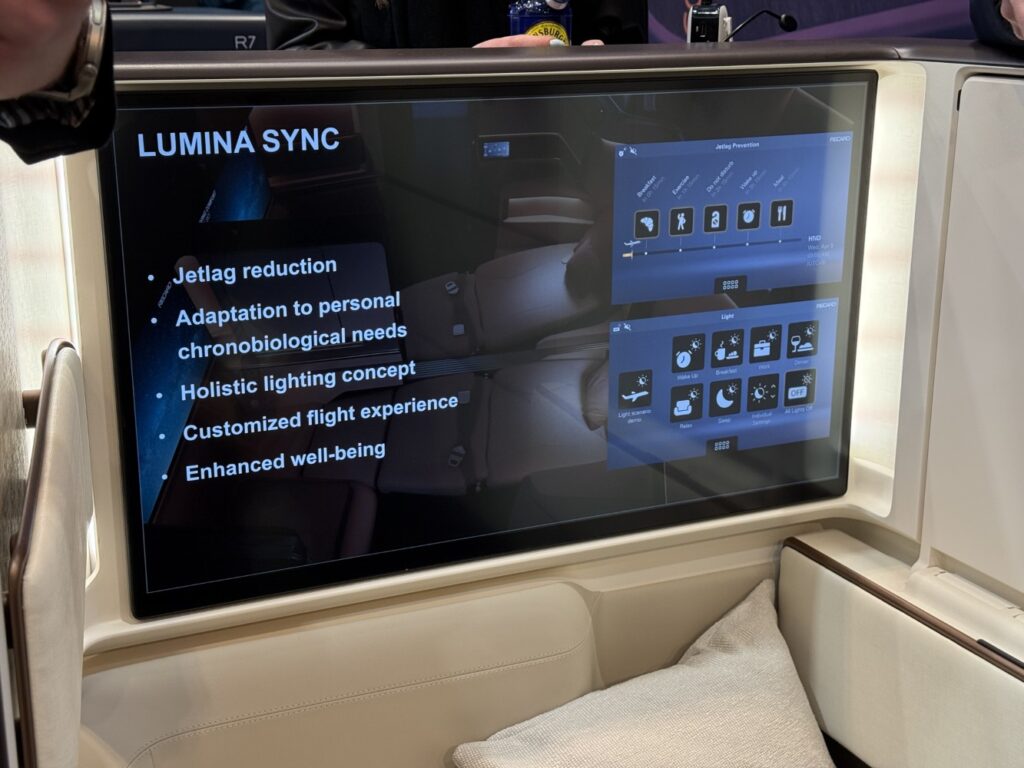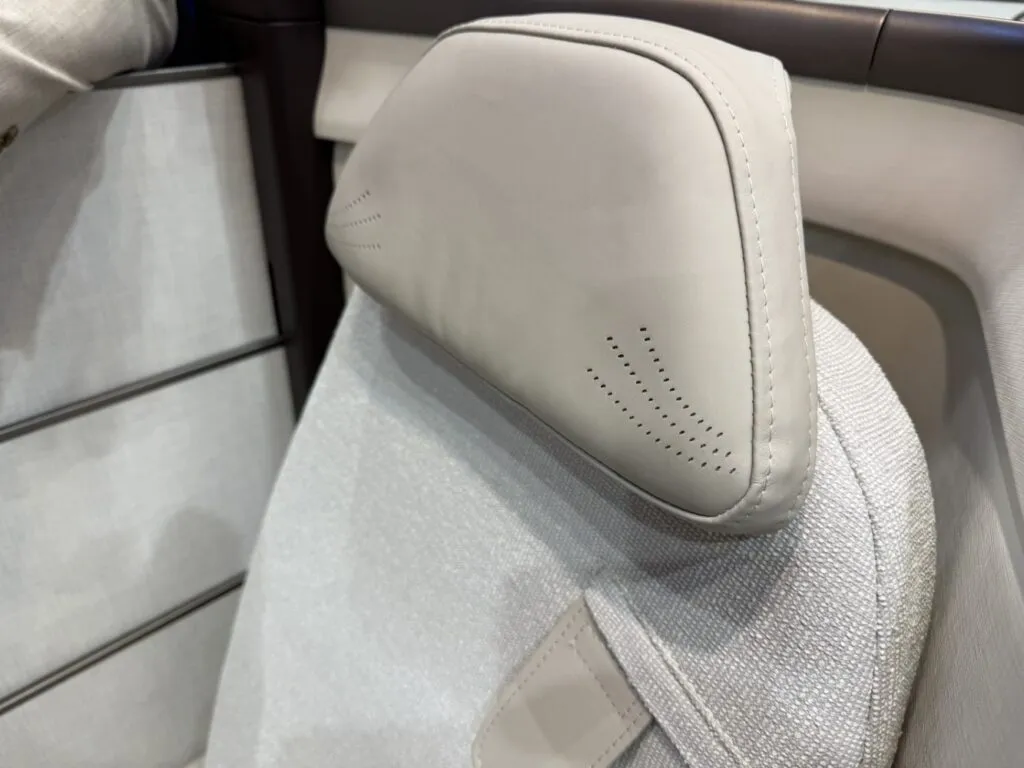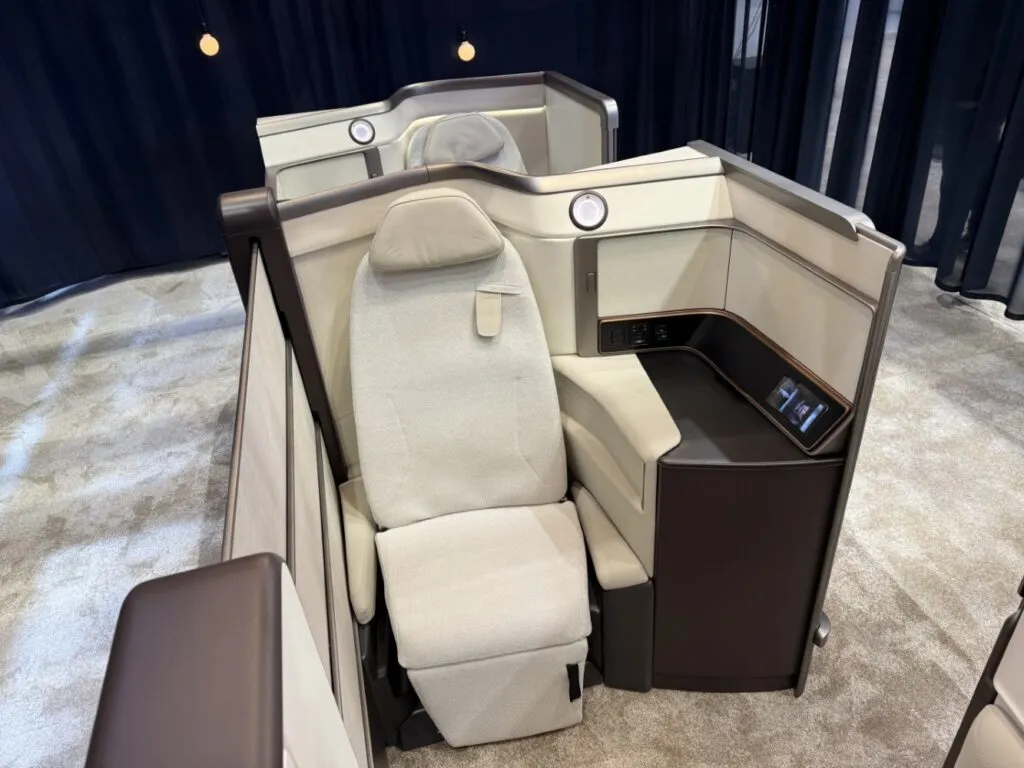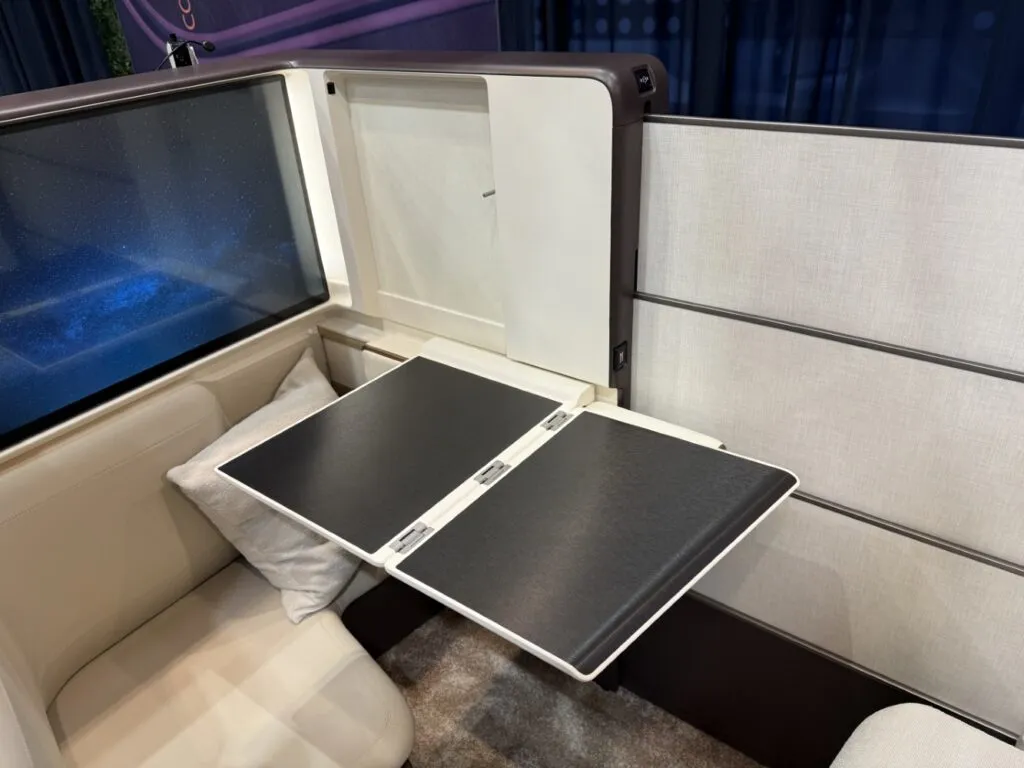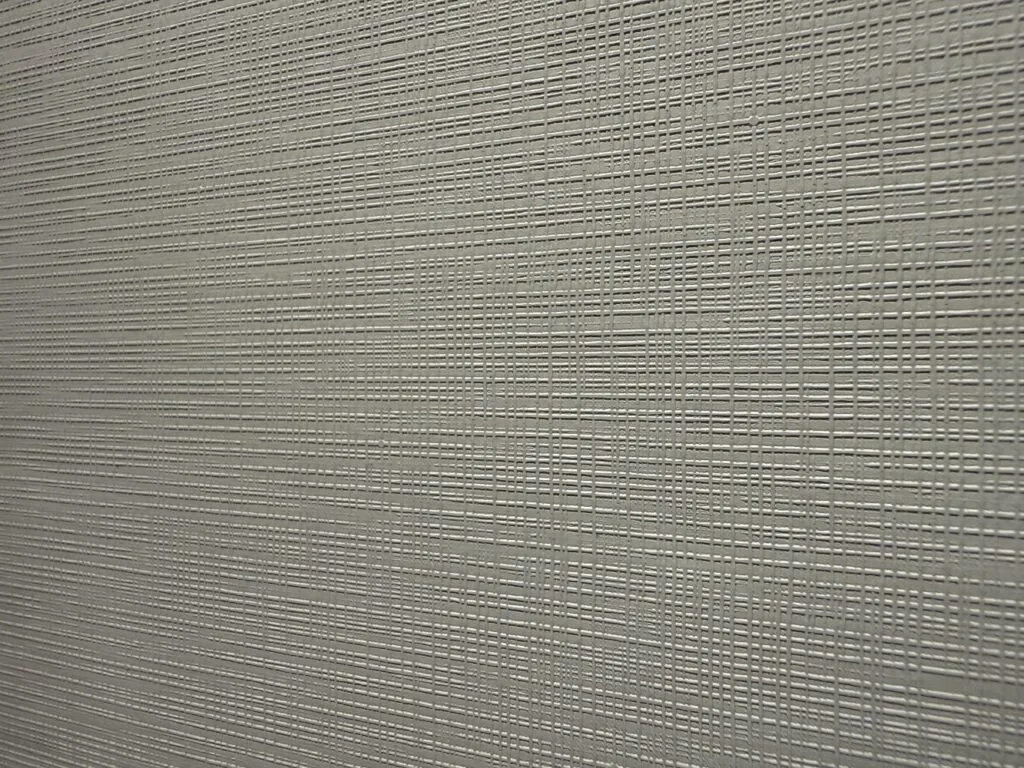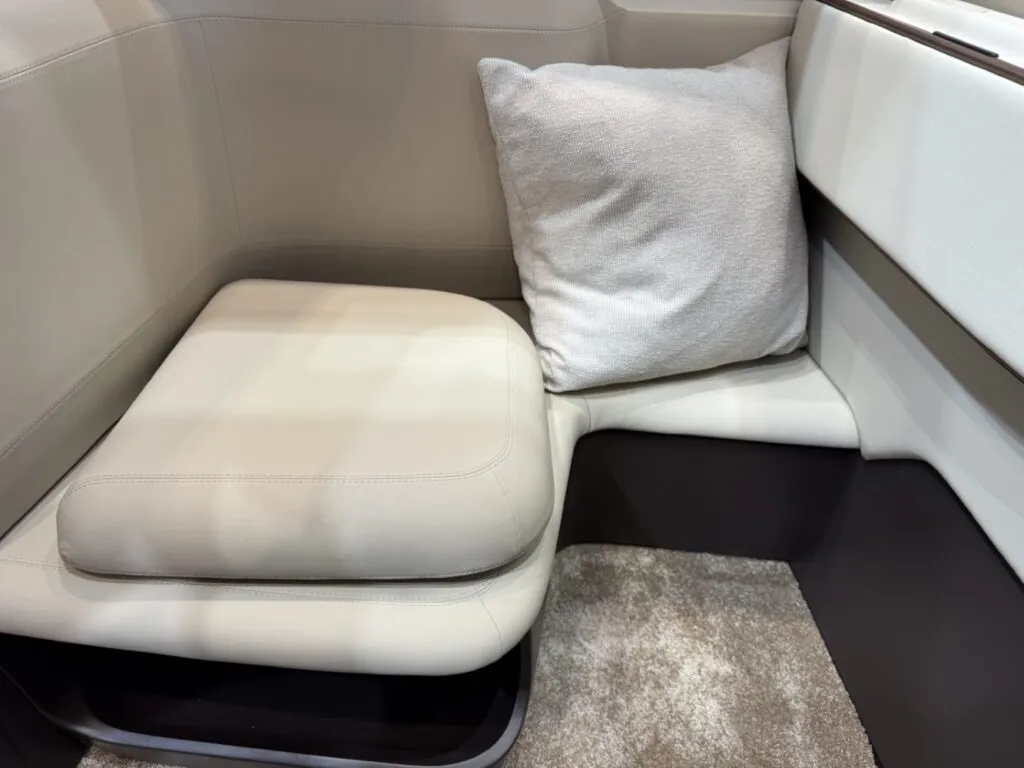HAMBURG — German seatmaker Recaro’s big news this Aircraft Interiors Expo is around its R7 business class, with an airframe-customised A330 version, an updated front-row-first-class option, and integration of sub-supplier seat environment technology like Comfort Motion’s Healthy Motion Seating.
R7, formerly the CL6720, was developed from the earlier non-doored CL6710 launched by TAP Air Portugal, with the doored version more recently seen on Iberia’s A350. From a genesis as one of the late 2010s’ breed of compact staggered seats, Recaro is expanding R7 with new features, an updated demonstration set of CMF (colour, material and finish), and a specific version aimed at the narrower confines of the Airbus A330.
We’ll start with the A330 version, where the customised R7 hugs the aircraft sidewall closely, enabling a substantially — and impressively — wider seat on the outboard seats.
The key part of the new A330 version of R7 is the strong curve to mimic the fuselage sidewall. Image: John Walton
It does, naturally, bring some tradeoffs that include a lowered inflight entertainment monitor and a smaller tray table that will perturb plumper or portlier passengers.
The A330 R7 also shifts its orientation from being slightly angled at 8.5° away from centerline to being fully forward-facing, which enables a wider seat but by necessity increases pitch to a current minimum of 43” for this A330-specific product. Recaro estimates that this should reach roughly 19 passengers on the A330-200 and 29 passengers on the A330-300.
Overall this is an excellent improvement, but the big question for implementation (with, the seatmaker says, an airline partner with which it is developing the seat) is how close the window-adjacent passengers are to the sidewall of the aircraft.
Elsewhere on R7 is Plus an improved premium set of CMF for the seat — bringing it to a level approaching CMF work within the industry, though not eclipsing other manufacturers’ in-house display trim — that also offers an updated front row business-plus product.
The new CMF extends backwards from the front row seat on the stand. Image: John Walton
This front-row business-plus seat is by no means revolutionary, offering greater foot space and some partner dining, but as a follower product in this category it doesn’t move the passenger experience needle as much as it needs to, rather like Safran’s Unity Elite in advance of last year’s AIX.
The front-row business-plus seat tapers at the front, like here on its A350 model. Image: John Walton
There are, however several quality-of-life tech improvements within the suite that are nice touches.
The front-row option adds a bigger screen, more foot space and the option for buddy dining. Image: John Walton
One improvement is the inclusion of ambient lighting with a programmable white point: cooler blue when you want daytime, warmer orange when you want nighttime, and an automatic option if you want to leave it up to the system’s programming.
Lumina Sync is the light white point adjustment system. Image: John Walton
Another is an in-headrest audio system that also included backrest rumble speakers, something of a combination of Safran’s Euphony, Collins/Panasonic’s Maya and the InSeat/Stelia Opal seat from 2018.
Recaro was also showing an in-seat sound system. Image: John Walton
Perhaps the one your author was most anticipating was the Healthy Motion Seating from Comfort Motion Global, which is software that is supposed to make slow, minute adjustments to the seating position that are almost imperceptible, in order to adjust the body’s weight-bearing positions and resulting pressure points. This was not a success in the Recaro implementation, with multiple journalists on the stand — including your author — feeling that the adjustments were just movements at the seat’s normal speed, rather more like the result of what happens when leaning one’s elbow on a control by mistake than a minute adjustment as expected.
Recaro’s experts explained that this requirement for more substantial movement than anticipated was a limitation of the firmware existing seat actuator on the R7, one that cannot be overcome by the Healthy Motion Seating software on this seat.
The buddy table is also a little narrow, with the mechanism and usability feeling like they could take a few more rounds of improvements. Image: John Walton
One glaring omission — or, depending on how you look at it, commission — was the inclusion of capacitative-only seat controls across the R7 range without any kind of tactile addition for passengers who are blind, have visual disabilities, or even have reduced visual acuity that can be remedied on a daily basis by wearing spectacles. These were a single capacitative touchscreen to control the seat that was entirely smooth, without even the most basic set of tactile bumps like those seen on computer keyboards or telephones with dialling pads, let alone those seen on some other seats, to orient users’ fingers.
After a Passenger Experience Conference keynote session ahead of the expo in that very same morning where the industry’s suppliers were very keen to highlight that their accessibility innovations are available if only airlines would just choose them, the choice by Recaro not to include the most basic of accessibility elements felt like a fundamental exclusion of disabled passengers.
At the other end of the #PaxEx spectrum, Recaro is also updating the seat model it uses for its eight-week, short-leadtime, low-customisation SPRINT programme. That programme previously used the BL3530, but will now use the R2 seat, which was previously known as the BL3710.
Targeting the lease transition market — plus airlines needing a quick shipset or two of seats — and available as R2 SPRINT from the third quarter of 2025, the new generation of seat cuts weight by over 15 percent and also adds additional space for passengers.
The new R7 CMF was an improvement, but Recaro is still at around a B- or C+ compared with the rest of the class. Image: John Walton
In buddy mode, there’s a cushion on the R7 Plus to pop on the ottoman to raise it to a level where a person might almost reasonably sit to dine. Image: John Walton
Related Articles:
Featured image credited to John Walton


